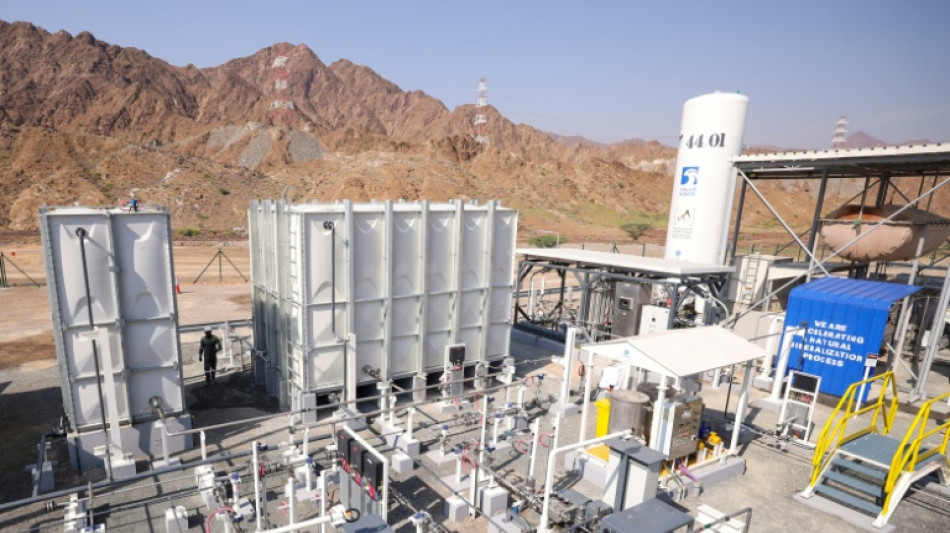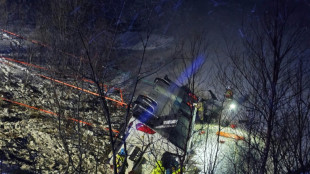
-
 Fritz motivated for Slam success after low-key off-season
Fritz motivated for Slam success after low-key off-season
-
Move over Mercedes: Chinese cars grab Mexican market share

-
 Zverev aiming to challenge Sinner for top ranking
Zverev aiming to challenge Sinner for top ranking
-
N. Korean soldier captured in Russia-Ukraine war: Seoul

-
 Inspired Tsitsipas looking to 'refresh, regroup' in Australia
Inspired Tsitsipas looking to 'refresh, regroup' in Australia
-
Seahawks edge Bears to boost NFL playoff hopes

-
 Thunder NBA win streak at nine as Shai ties career high with 45
Thunder NBA win streak at nine as Shai ties career high with 45
-
India announces state funeral for ex-PM Manmohan Singh

-
 Japan govt approves record budget for ageing population, defence
Japan govt approves record budget for ageing population, defence
-
Japanese shares gain on weaker yen after Christmas break

-
 South Korea's acting president faces impeachment vote
South Korea's acting president faces impeachment vote
-
Fleeing Myanmar, Rohingya refugees recall horror of war

-
 Smith century puts Australia in control of 4th Test against India
Smith century puts Australia in control of 4th Test against India
-
Israeli strikes hit Yemen as Netanyahu fires warning

-
 Peru ex-official denies running Congress prostitution ring
Peru ex-official denies running Congress prostitution ring
-
Australia's Smith reaches 34th Test century

-
 NHL Red Wings fire Lalonde and name McLellan as head coach
NHL Red Wings fire Lalonde and name McLellan as head coach
-
Injured Halep withdraws from Australian Open

-
 Liverpool power seven points clear, Man Utd crash at Wolves
Liverpool power seven points clear, Man Utd crash at Wolves
-
Leaders Liverpool survive Leicester scare to go seven points clear

-
 Membership of UK's anti-immigration Reform party surpasses Conservatives
Membership of UK's anti-immigration Reform party surpasses Conservatives
-
Two dead in treacherous Sydney-Hobart yacht race

-
 Amorim warns of 'long journey' ahead for miserable Man Utd
Amorim warns of 'long journey' ahead for miserable Man Utd
-
Three dead, four injured in Norway bus accident

-
 Man Utd fall to Wolves as Fernandes sees red
Man Utd fall to Wolves as Fernandes sees red
-
Fernandes sent off as Man Utd crash at Wolves, troubled Man City held by Everton

-
 'Logical' that fatigued Spurs are faltering - Postecoglou
'Logical' that fatigued Spurs are faltering - Postecoglou
-
Manmohan Singh: technocrat who became India's accidental PM

-
 India's former PM Manmohan Singh dies aged 92
India's former PM Manmohan Singh dies aged 92
-
Acid risk contained in deadly Brazil bridge collapse

-
 Chelsea stunned by Fulham in blow to Premier League title hopes
Chelsea stunned by Fulham in blow to Premier League title hopes
-
Troubled Man City held by lowly Everton, Chelsea title bid rocked

-
 Paterson, Bosch give South Africa edge over Pakistan in first Test
Paterson, Bosch give South Africa edge over Pakistan in first Test
-
Oil leak in Peru tourist zone triggers 'environmental emergency'

-
 Mozambique post-election violence kills 125 in three days: NGO
Mozambique post-election violence kills 125 in three days: NGO
-
Finns probing ship from Russia for 'sabotage' of cables

-
 Williams hits unbeaten 145 as Zimbabwe make Afghanistan toil
Williams hits unbeaten 145 as Zimbabwe make Afghanistan toil
-
Bowlers bring Pakistan back into first Test in South Africa

-
 Banbridge foils French to land King George VI Chase for Ireland
Banbridge foils French to land King George VI Chase for Ireland
-
Man City pay penalty for Haaland miss in Everton draw

-
 Paterson takes five wickets as Pakistan bowled out for 211
Paterson takes five wickets as Pakistan bowled out for 211
-
Kremlin cautions on 'hypotheses' over plane crash

-
 Pakistan military convicts 60 more civilians of pro-Khan unrest
Pakistan military convicts 60 more civilians of pro-Khan unrest
-
Turkey lowers interest rate to 47.5 percent

-
 Syria authorities launch operation in Assad stronghold
Syria authorities launch operation in Assad stronghold
-
Record number of migrants lost at sea bound for Spain in 2024: NGO

-
 Kohli called out over shoulder bump with Konstas during fourth Test
Kohli called out over shoulder bump with Konstas during fourth Test
-
Rural communities urged to flee east Australia bushfire

-
 Sri Lanka train memorial honours tsunami tragedy
Sri Lanka train memorial honours tsunami tragedy
-
S. Korea's opposition moves to impeach acting president


UAE to pump CO2 into rock as carbon capture debate rages
High in remote mountains in the oil-rich United Arab Emirates, a new plant will soon take atmospheric CO2 and pump it into rock -- part of controversial attempts to target planet-heating emissions without abandoning fossil fuels.
Using novel technology developed by Omani start-up 44.01, the solar-powered plant will suck carbon dioxide from the air, dissolve it in seawater and inject it deep underground, where it will mineralise over a period of months.
The new site on the Gulf of Oman is funded by state oil giant ADNOC, whose CEO Sultan Al Jaber is president of the UN's COP28 climate talks and chairman of Masdar, a renewable energies company.
The first CO2 injection is expected during COP28 which starts on Thursday in nearby Dubai, and where the debate over hydrocarbons will be a key battle between campaigners and the oil lobby.
"We believe this volume of rocks here in the UAE has the potential to store gigatons of CO2," ADNOC's chief technology officer Sophie Hildebrand told AFP during a tour of the facility this week.
"ADNOC has committed $15 billion to decarbonisation projects," she added, declining to say how much was spent on the Fujairah plant.
The UAE is the world's seventh largest oil producer, and plans to invest $150 billion by 2027 to expand its oil and gas production capacity.
Oil producers are throwing their weight behind carbon capture and storage (CCS) technology as a global warming solution despite criticism from climate experts who caution it is insufficient to tackle the crisis.
With little investment and few projects in operation around the world so far, the technology is currently nowhere near the scale needed to make a difference to global emissions.
- 'Unproven at scale' -
The UN's Intergovernmental Panel on Climate Change (IPCC) says the existing fossil fuel infrastructure -- without the use of carbon capture -- will push the world beyond the desired limit of 1.5 degrees Celsius above pre-industrial levels.
At the plant in Fujairah, one of the UAE's seven sheikhdoms, giant fans extract CO2 directly from the surrounding atmosphere.
Liquid CO2 is stored in vertical tanks, then converted into gas and dissolved in seawater that will be injected into a well that is one kilometre (0.6 mile) deep.
"It will be around eight months for the CO2 to be fully mineralised in the subsurface from the moment of injection," said Talal Hasan, CEO of 44.01.
The company, one of the 2022 winners of the UK's Earthshot Prize, has already carried out a test injection of around 1.2 tons of CO2 in Oman.
"This is a 10 to 15 times scale-up of the Oman pilot," said Hasan.
The "target rate is one ton of CO2 per day for an initial period of 10 days," he added.
When asked about cost, he said the aim is to make it competitive with more conventional carbon storage techniques.
"Our target is to eventually reach a cost of about $15 per ton of CO2 sequestered, not including the cost of the actual capture of the CO2," he said.
Jaber, the COP28 president and head of ADNOC, has said climate diplomacy should focus on phasing out oil and gas emissions -- not necessarily the fossil fuels themselves.
Climate campaigners have raised concerns about the influence of fossil fuel interests at COP28, where the benefits of carbon capture will be strongly pushed.
"When negotiating parties speak of phasing down unabated fossil fuels, they are excluding those fuels whose emissions were mitigated by carbon capture and storage," said Karim Elgendy, associate fellow at Britain's Chatham House think tank.
"The issue with carbon capture and storage technologies is that they are unproven at scale," he said.
S.Caetano--PC



